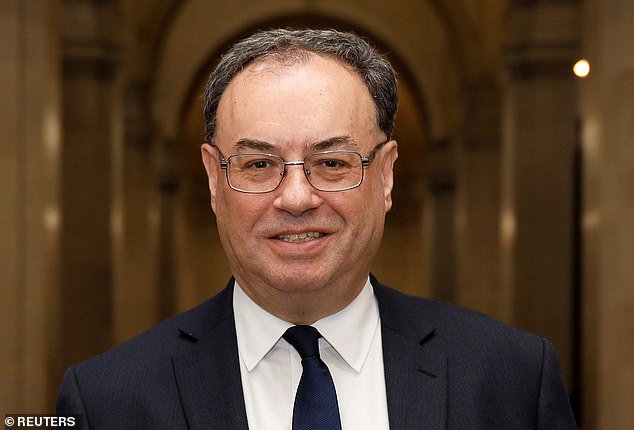As a rule, public servants rarely apologise, even when faced with world-class mistakes.
Montagu Norman never said sorry for putting Britain back on the gold standard in 1925 and there was no mea culpa from the late Eddie George over the Barings implosion in 1995.
In that context, the apology by Andrew Bailey to bondholders in the failed investment vehicle London Capital & Finance (LCF), which collapsed when he was chief executive of the Financial Conduct Authority (FCA), is something of a first and very refreshing.
Sorry: The apology by Andrew Bailey to bondholders in the failed investment vehicle London Capital & Finance is something of a first
Running the deeply flawed financial regulator was the hoop through which Bailey had to jump to succeed climate-change warrior Mark Carney as governor of the Bank of England.
There was a risk that the change of regime in Downing Street to Boris Johnson would cook Bailey’s goose after a series of regulator debacles on his watch.
But the Treasury mandarins, who had worked alongside Bailey in the furnace of the financial crisis, were smart enough to guide then chancellor Sajid Javid to Bailey from a powerful shortlist, which included international finance stars, Brexiteer economists and female candidates.
A fascinating aspect of Bailey’s apology is his mention of the fact that when he inherited the FCA in July 2016 it was (and still is) responsible for policing 60,000 financial firms. Its reach extends from the backstreet garage, with a side =line in motor insurance, to the conduct of some of the world’s global banks such as HSBC.
Amid that deep forest, together with the mammoth effort of reshaping UK regulation for the post-Brexit era, it is understandable that some wrong’uns – including LCF and Connaught – were flagged up and missed.
The label of respectability provided by an FCA kite-mark which sucked 11,000 ordinary savers into what proved to be a scam was shameful.
If saying sorry for LCF were to draw a line under Bailey’s stewardship at the FCA, it would be case done and dusted. But I fear there are more skeletons in the cupboard which new chief executive Nikhil Rathi might want to get out the door.
Endless legal obstacles prevented Bailey from releasing a report assigning management responsibility for the collapse of HBOS.
Of more immediate interest is the collapse of Neil Woodford’s multi-billion pound investment empire, leaving 300,000 plus investors nursing heavy losses. Woodford was not an outlier such as LCF.
He was Britain’s most lauded investor whose funds were favoured by the some of the largest platforms in the land, Hargreaves Lansdown and St James Place. It is known from Parliamentary probes that the FCA had ample opportunities to intervene earlier, and didn’t.
It is hard to believe that when, and if, the FCA-sponsored inquiry into the Woodford affair is published that the enforcer will not be found culpable of serious mistakes.
In terms of scale, the implications of Woodford are far greater than LCF for the reputation of the City and trust in the savings culture. Having set an honourable precedent by apologising once, Bailey has created a jeopardy.
As the governor of the Bank of England who has steered the UK skilfully through the pandemic, Bailey deserves the benefit of the doubt over LCF. But if the FCA were to be found wanting over Woodford it could become a resigning issue for the governor.
Inside job
If investors and First Nation Australians were looking for new blood to head Rio Tinto, after the Juukan Gorge atrocity, they will be disappointed.
What they have been given is Danish bean counter Jakob Stausholm, who as finance director worked alongside discarded chief executive Jean-Sebastien Jacques.
Stausholm has a good business track record which includes stints at Royal Dutch Shell and Moeller-Maersk.
But he has limited experience of a fast changing, more politically correct mining industry and, other than being Danish, there is little evidence to suggest that he has charisma and values to redeem Rio’s reputation.
Rio and its chairman, Simon Thomson, who has been leading the battle to restore the trust of the First Australian group the PKKB, are dismissive of suggestions that some of the bigger names in mining turned the job down before the group turned to its finance director.
But if real cultural change is the name of the game then stakeholders might well have preferred an untainted outsider. It will be up to Stausholm to prove them wrong.
Some links in this article may be affiliate links. If you click on them we may earn a small commission. That helps us fund This Is Money, and keep it free to use. We do not write articles to promote products. We do not allow any commercial relationship to affect our editorial independence.

